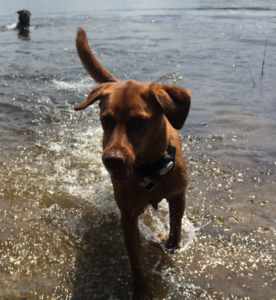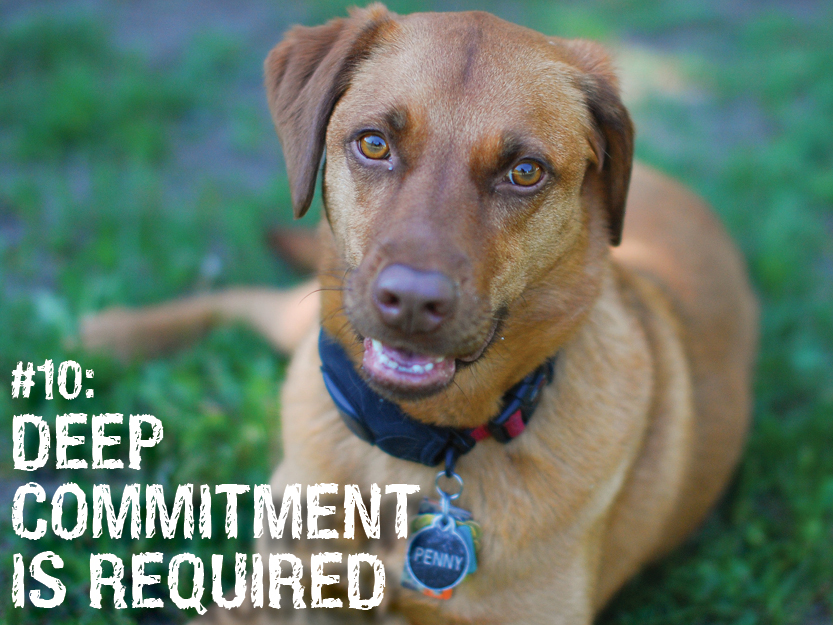Greetings, my fundraising friends!
Those of us who love dogs know they are a constant source of life lessons; in fact, most dog trainers will admit their classes focus more on training the humans than the dogs. To that end, I’m continuing Penny’s lessons to me (and you!) on the art of donor-centered fundraising. Sit. Stay. Read.
(Wondering about tips 1-8? You’ll find them here.)
9. Regular, effective communication is key.
 Training Penny requires consistent practice and regular use of commands. If we go too long between use of a command, she forgets things. And if I don’t communicate clearly, she gets confused and eventually tunes me out.
Training Penny requires consistent practice and regular use of commands. If we go too long between use of a command, she forgets things. And if I don’t communicate clearly, she gets confused and eventually tunes me out.
Keeping in regular contact with your supporters so they feel informed and involved is critical. And your communications must tell compelling stories, speak to your donors’ interests, and be easily digestible. Send too much that’s boring, dense, and all about you, and you’ll just train your donors to tune you out.
 10. Deep commitment is required.
10. Deep commitment is required.
Having a dog is a serious responsibility. You have to be committed to giving them the training, love, attention, and exercise they need to be happy and healthy. Sometimes this means doing things I don’t want to do. And sometimes it means not doing things I do want to do. But I made a commitment when I adopted Penny and I won’t let her down.
You also made a commitment when you asked your supporters to donate and I hope you won’t let them down. Your donors need love and attention to be happy and feel like part of your mission. Sometimes this means doing things in a way that’s not as efficient or cost effective as possible. Regardless, your commitment must be focused on the experience of your donors — even if it takes a little longer to hand address those envelopes or costs a little more to send them first class.
11. First impressions matter.
 Early on, Penny had an unfortunate run-in with the two Belgian Shepherds who lived across the street. It was not at all their fault; they are very sweet dogs. Regardless, Penny has never forgiven them. She even had a special howl reserved for when Angus and Cormac passed by the house!
Early on, Penny had an unfortunate run-in with the two Belgian Shepherds who lived across the street. It was not at all their fault; they are very sweet dogs. Regardless, Penny has never forgiven them. She even had a special howl reserved for when Angus and Cormac passed by the house!
Deserved or not, first impressions stick. You only have one chance to get it right. And, with 80% of first-time donors not giving a second gift, we aren’t getting it right much of the time. How do you respond after someone makes their first gift? Is your “thank you” letter prompt, personal, genuine, and welcoming? Do you send a welcome packet? Do you report back to them on how their gift made a difference?
 12. Good training makes a world of difference.
12. Good training makes a world of difference.
Except for the occasional squirrel, Penny is a fairly obedient dog. This is mostly due to the training she got as a puppy. I got lucky with her temperament but the best of temperaments won’t make up for poor training. In most cases, dogs are as good as the training we give them.
Likewise, staff, board members, and volunteers are only as good as the training and education they receive. No one is born knowing how to be a fundraiser. Quite the contrary! Invest in learning the core body of knowledge related to resource development and share that knowledge at all levels of your organization. Don’t ever stop learning!
13. Communications preferences must be learned and respected.
 Penny doesn’t like to be pet on the top of her head. Dogs have a blind spot above their heads and Penny is very shy. So when you come in with your hand from above, it startles her. Knowing this, I coach others how to approach her to get the best response.
Penny doesn’t like to be pet on the top of her head. Dogs have a blind spot above their heads and Penny is very shy. So when you come in with your hand from above, it startles her. Knowing this, I coach others how to approach her to get the best response.
You need to learn how your donors want to receive your communications. Do they like postal mail? Email? Phone calls? What time? How often? Offer supporters the chance to choose when and how they want to hear from you, and what they want to hear about. This will move you from being an intrusion to being an invited guest.
 14. Plan ahead and anticipate what’s coming.
14. Plan ahead and anticipate what’s coming.
Penny is particularly suspicious of solo men out in the world without a partner, a child, or a dog. If we’re walking and I see a man on his own, we cross the street. I’m always trying to think a few steps ahead to avert any potential problems that could arise while we’re out.
The best way to anticipate what’s coming as a development professional is by having a written development plan. Creating a plan will help you sets goals that promote growth and create ownership among your entire fundraising team. And, it will enable you to maximize your resources, track your progress, identify problems as they arise, and avoid crisis fundraising. All good things, right?
15. Repeating core messages over and over is only boring to you.
 Any time Penny does what I want her to do, I say, “Good girl.” It’s virtually a reflex for me at this point. And it doesn’t matter how many times she’s heard it, Penny wags her tail in delight.
Any time Penny does what I want her to do, I say, “Good girl.” It’s virtually a reflex for me at this point. And it doesn’t matter how many times she’s heard it, Penny wags her tail in delight.
If you have a message that works with your donors, stick with it. It may be boring to you but you live it every day. It’s not boring to your donors. They appreciate the heartwarming reminder of the difference they can and do make in the world. They may even wag their tails in delight!
 16. Having bonds with many people is critical.
16. Having bonds with many people is critical.
Because I got Penny on my own, I made a point of making sure she spent time with people without me. I wanted her to know she’d be okay if I wasn’t around and that I’d come back. Because of this bonding time, Penny has a few surrogate mommas that I can depend on to pinch hit for me and it’s a seamless handoff.
Your donors should have relationships with multiple people at your organization. Sure, one person may have brought them into the fold. But you must make the effort to build additional connections. Having bonds with more than one staff or board member is important for maintaining relationships with supporters if and when the person who referred them moves on.



